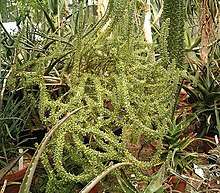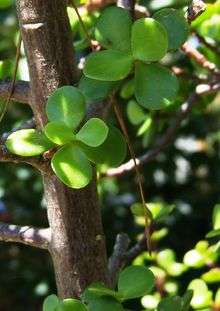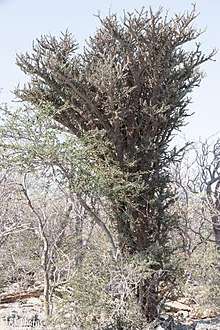Didiereaceae
Didiereaceae is a family of flowering plants found in continental Africa and Madagascar. It contains 20 species classified in three subfamilies and six genera. Species of the family are succulent plants, growing in sub-arid to arid habitats. Several are known as ornamental plants in specialist succulent collections. The subfamily Didiereoideae is endemic to the southwest of Madagascar, where the species are characteristic elements of the spiny thickets.
| Didiereaceae | |
|---|---|
 | |
| Alluaudia montagnacii | |
| Scientific classification | |
| Kingdom: | Plantae |
| Clade: | Tracheophytes |
| Clade: | Angiosperms |
| Clade: | Eudicots |
| Order: | Caryophyllales |
| Family: | Didiereaceae Radlk.[1] |
| Subfamilies | |
| |
Systematics
The family was long considered entirely endemic to Madagascar until the genera Calyptrotheca, Ceraria, and Portulacaria from the African mainland were included.[2] Molecular phylogenetic analysis confirmed the monophyly of the family and its three subfamilies:[3]
| Didiereaceae |
| ||||||||||||||||||||||||||||||
The family is closely related to the New World family Cactaceae (cacti), sufficiently closely so that species of Didiereaceae can be grafted successfully on some cacti.[3]
Calyptrothecoideae
Contains only one genus, Calyptrotheca, with two species found in tropical East Africa.[3]
Didiereoideae
This subfamily is endemic to Madagascar, where it is found in the spiny thickets of the dry southwest. The plants are spiny succulent shrubs and trees from 2–20 m tall, with thick water-storing stems and leaves that are deciduous in the long dry season. Some species build a distinct youth form as small procumbent shrubs before a dominant stem is produced. All species are dioecious (Decaria female-dioecious). The leaves, produced from the brachyblasts (much like the areoles found in cacti), are small, appear single or in pairs and are accompanied by conical spines. The flowers are unisexual (except from Decaria) and radially symmetric.
There are four genera with eleven species:
- Alluaudia ascendens (Drake) Drake 1903
- Alluaudia comosa (Drake) Drake 1903
- Alluaudia dumosa (Drake) Drake 1903
- Alluaudia humbertii Choux 1934
- Alluaudia montagnacii Rauh 1961 – probably a natural hybrid of A. ascendens and A. procera
- Alluaudia procera (Drake) Drake 1903 – quite easy grown and the most frequent species in cultivation
Alluaudiopsis Humbert & Choux 1934
Decarya Choux 1929
- Decarya madagascariensis Choux 1929
- Didierea madagascariensis Baillon 1880
- Didierea trollii Capuron & Rauh 1961
Key to the genera of Didieroideae:
| 1 | Spines in groups of four or more: | Didierea |
| - | Spines single or in pairs: | → 2 |
| 2 | Shoots striking zigzagged, spines short conical: | Decarya |
| - | Shoots not zigzagged, spines long conical to needle-like: | → 3 |
| 3 | Shrubs strongly branched, leaves lanceolate: | Alluaudiopsis |
| - | Shrubs little branched, leaves either ovate to circular or scale-like and awl-shaped: | Alluaudia |
Portulacarioideae
Contains one genus, Portulacaria, with seven species, distributed in Southern Africa. Species formerly considered in the separate genus Ceraria are now included in Portulacaria.[3]
Gallery
 Portulacaria namaquensis
Portulacaria namaquensis
- Alluaudia ascendens
 Alluaudia comosa
Alluaudia comosa Alluaudia montagnacii
Alluaudia montagnacii- Alluaudia procera
References
- Angiosperm Phylogeny Group (2009). "An update of the Angiosperm Phylogeny Group classification for the orders and families of flowering plants: APG III". Botanical Journal of the Linnean Society. 161 (2): 105–121. doi:10.1111/j.1095-8339.2009.00996.x. Archived from the original (PDF) on 2017-05-25. Retrieved 2013-06-26.
- Applequist, Wendy L.; Wallace, Robert S. (2003). "Expanded circumscription of Didiereaceae and its division into three subfamilies" (PDF). Adansonia. 25 (1): 13–16. ISSN 1280-8571.

- Bruyns, Peter V.; Oliveira-Neto, Mario; Melo-de-Pinna, Gladys Flavia; Klak, Cornelia (2014). "Phylogenetic relationships in the Didiereaceae with special reference to subfamily Portulacarioideae". Taxon. 63 (5): 1053–1064. doi:10.12705/635.36. ISSN 0040-0262.